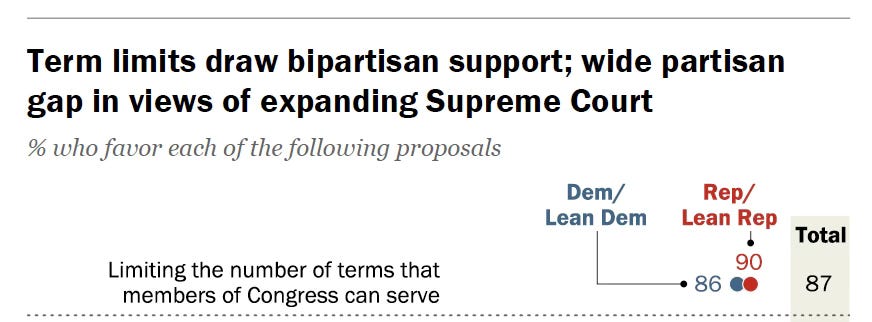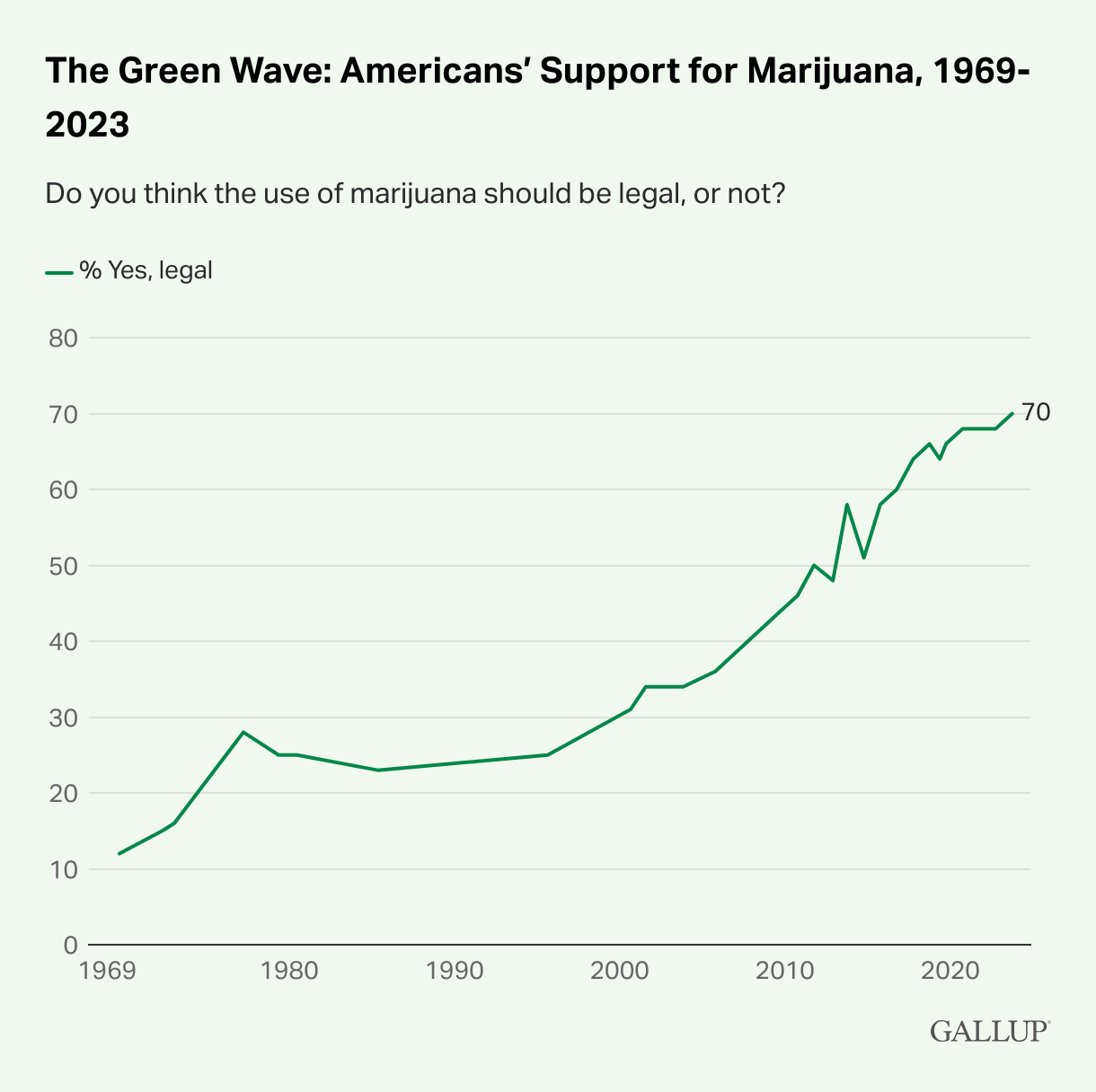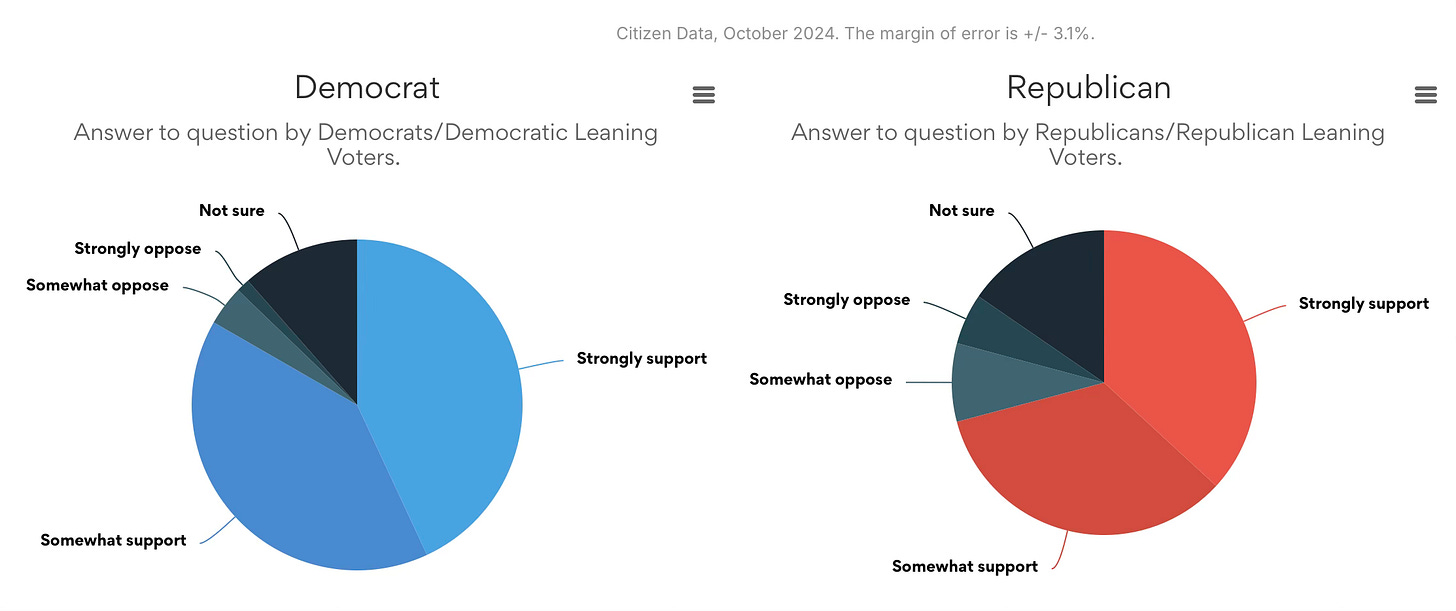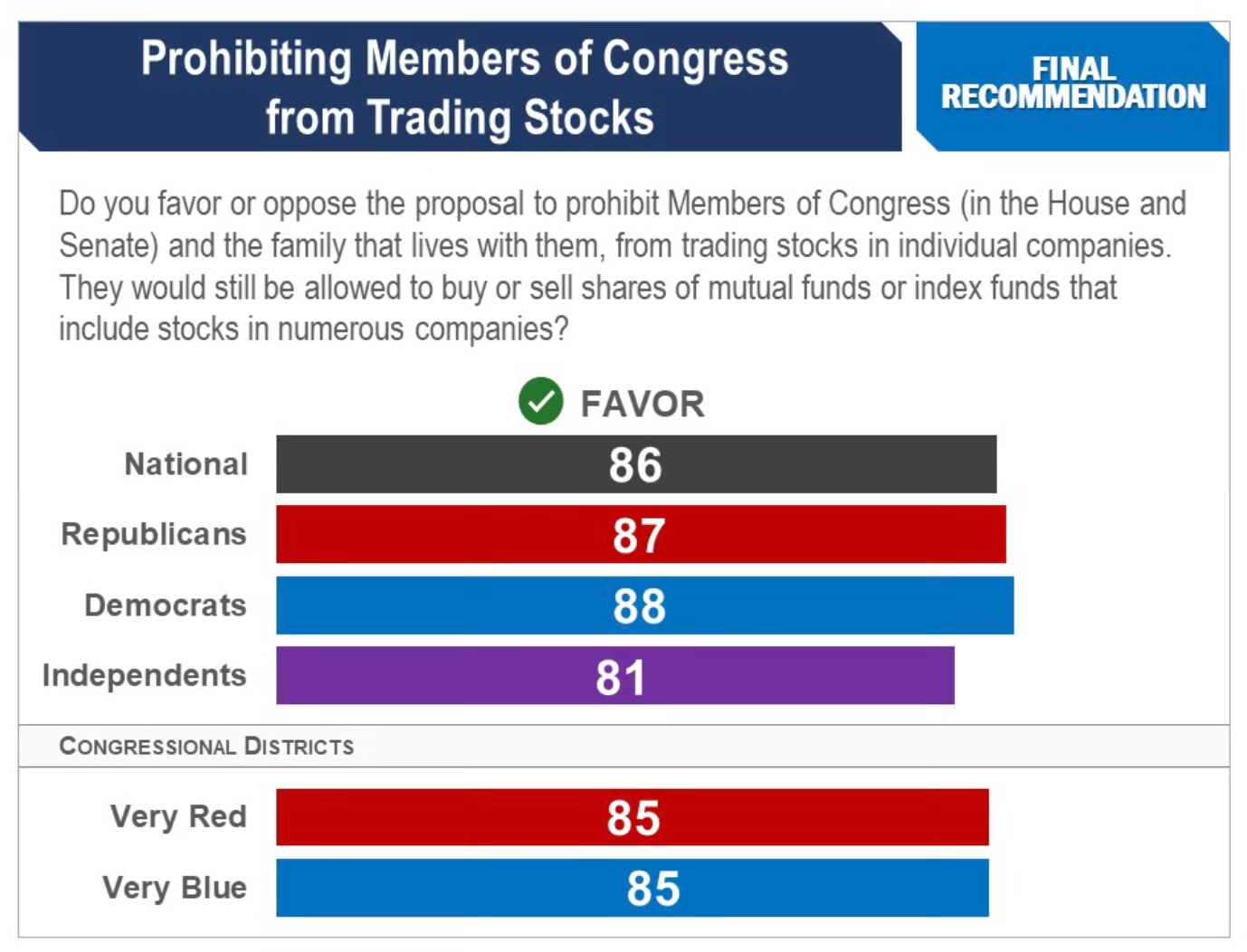Issues with widespread bipartisan agreement that never go anywhere
A marker for why we need more structural governance reform.
In a country currently known for deep political divisions, some issues still garner supermajority agreement, yet nothing gets done about them. To me, these issues simultaneously represent hope and despair:
Hope—yes, we can agree on some important things.
Despair—uh oh, our widespread agreement isn’t translating into actual change.
In other words, the existence of issues with durable, supermajority agreement, which nevertheless never materializes into change, is a strong indicator that we need some significant structural reform. I have ideas for that, but first, let me try to convince you that these magical issues exist!
1. Congressional Term Limits
From a 2023 Pew Research report:
Term limits for members of Congress are widely popular with both Republicans and Republican-leaning independents (90%) and Democrats and Democratic leaners (86%).
This isn’t new. A 2013 Gallup poll showed similar results, noting that these results were also “similar to those from 1994 to 1996 Gallup polls.”
2. Legalizing Marijuana
From a 2023 Gallup poll, which has been polling this issue for decades:
For the second straight year, majority support for legalization is found among all major subgroups, including by age, political party and ideology.
3. Digital Privacy
From a 2023 Pew Research report:
A majority of Democrats and Republicans say there should be more government regulation for how companies treat users’ personal information (78% vs. 68%).
They also note that “[t]hese findings are largely on par with a 2019 Center survey that showed strong support for increased regulations across parties.”
4. Limiting Money in Campaigns
From a 2024 American Promise poll:
“A proposed constitutional amendment would allow Congress and the states to reasonably regulate and limit money in our campaigns and elections. Would you support or oppose this amendment?”
5. Universal Background Checks
From a 2023 Fox News poll:
87% of Americans support requiring criminal background checks on all gun buyers, including 83% support from gun owning households.
This is a long standing result, for example this 2019 Quinnipiac poll:
Voters support 93-6 percent "requiring background checks for all gun buyers." Support is 89-10 percent among Republicans and 87-12 percent among gun owners. Support for universal background checks has ranged from 88 to 97 percent in every Quinnipiac University poll since February 2013, in the wake of the Sandy Hook massacre.
6. Negotiating Medicare Prescription Drug Prices
From a 2024 KFF poll:
A large majority (85%) of voters say they support allowing the federal government to negotiate the price of some prescription drugs for people with Medicare. This includes at least three quarters of Republican (77%), independent (89%) and Democratic (92%) voters.
7. Congressional Stock Trading Ban
From a 2023 Maryland School of Public Policy study:
Overwhelming bipartisan majorities favor prohibiting stock-trading in individual companies by Members of Congress (86%, Republicans 87%, Democrats 88%, independents 81%)
These issues aren’t anomalies.
I stopped at seven issues, but there are many more issues like these, for instance, increasing veterans’ benefits (similarly supported by Pew/Gallup polling), and I’m sure there will be even more in the future. I recognize that some issues appear bipartisan at times, and then once a political party takes up the cause, they immediately become more partisan. But gun control, health care, and drugs, for example, have all been politicized in this manner. Yet, as noted above, supermajorities exist for specifically reasonable policies, including universal background checks, negotiating Medicare drug prices, and federal legalization of marijuana.
Each issue has its own set of reasons for persisting stubbornly without change, typically a combination of special interests, regulatory capture, and general congressional dysfunction.
I contend that, fundamentally, we, the people, need another path to change. (Incidentally, some original printed copies of the U.S. Constitution had a comma after we.)
How can “we the people” change things?
“We the people” leads off our Constitution, and yet it doesn’t provide a direct way for us to change it. I think it should. It would still have to be very hard to change the Constitution, but I think there should be a citizen path to do so, not just one that goes through elected officials.
Sixteen states already allow for totally citizen-initiated state-level constitutional amendments. Typically, a threshold of signatures (between 5-15% of the votes cast in a recent election) needs to be achieved to get on the ballot, and then a direct vote happens where, if a threshold is reached (50-60%), then the amendment is ratified.
I envision a similar process, but scaled up to the national level: Something like a signature requirement in enough states triggers getting a binding resolution on a federal election ballot. Then, if a supermajority of citizens in enough states vote for it, it is automatically ratified without additional involvement from Congress or state legislatures.
Many people have proposed similar things in the past, and I plan to examine them and put forward my thoughts on a more concrete proposal in the future. As in the past, I don’t expect anything actually to happen, but it at least helps clarify my thinking, and you never know— maybe we’re approaching a moment when something can happen.








Well said, good examples. And if the people who worry teachers’ unions have too much control over budgets and credentials, ever got together with the people who think police unions have too much power over management and discipline, the people would be well served.
I’ve been loosely involved in a few initiated constitutional amendment ballot initiatives (for primary election reform) and, like most things in politics, they come with a lot of political spending, tribalism, fear-mongering, and misleading discourse. Curious to hear your thoughts on citizen assemblies as another pathway. AI is going to transform so much of society; it could be an opportunity (and risk) to use it to reform governance too.